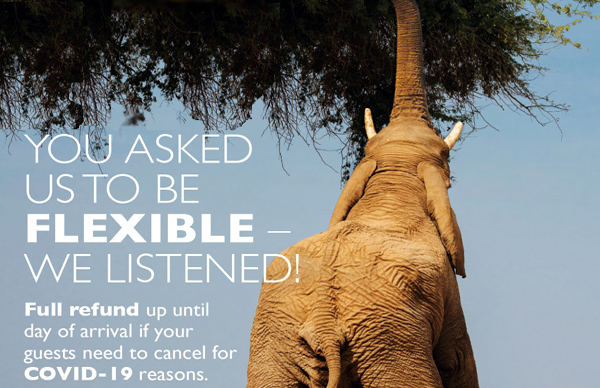
Would you book this company? If you were a travel agent like EWT would you send clients to a wholesaler who solicits you with the above message?
Before I answer note this is only one of dozens of such ads coming daily now mostly from what had been upmarket travel companies.
As a potential client, don’t fall for this. As an agent, play a better game.
The business geniuses who market messages like these may believe they’re doing something good: for themselves of course, but they may even believe that this is good for the industry and the client. That’s what’s so sad.
So I won’t call it a “scam,” because these companies believe they are being above-the-board and forthcoming. Here’s why they aren’t:
- Consumers have already been burnt.
Like the airlines, like the travel insurance companies, even in the case of America’s own government, consumers have been shafted. They’ve learned that they can’t depend on travel contracts.
Numerous EWT clients are victims of Swiss airlines, which didn’t refund tickets for flights they canceled. Swiss had been my favorite airline. EWT has numerous clients who are victims of other airlines and many, many clients who are still fighting their bonafide travel insurance claims.
And my government, America, has done little if anything to enforce the business law that would remedy these injustices.
So it doesn’t matter if some offer seems to be made from the heart by someone who will dig their own grave before pushing you into one; the industry has proved otherwise. Don’t accept any qualifications. Insist on simplicity.
- Travel contracts are red flags.
The particular contract attending the offer in the picture above is ludicrous. It’s not dissimilar to ordinary travel company contracts pre-Covid, particularly those coming out of South Africa. But in today’s climate it’s laughable.
Essentially the company defaults to an exclusive right to define – perhaps at any time, at any moment – what it considers “Covid-19 reasons.” So in this sense it truly is a scam.
What if you have a slight fever on arrival and the foreign country forces you into quarantine? Even if it isn’t because of Covid? What if you learn on arrival at the camp that half the staff is sick? What if you get an October vaccine that when you travel in January is proved ineffective?
And it goes on and on and that’s the point. No contract of any size can cover all the bases for some qualification like “Covid-19 reasons.” If your transaction isn’t immediately clear, if it requires a multi-page “contract,” dismiss the company.
- There are alternatives.
There are plenty of companies that have either not manifestly changed their former business practices or have shaved them down to something simple like, “Call us.” It’s much better to invite you making a deal than trying to predetermine one for you. Consumers are in control, now. - Assert your advantage.
As the head of EWT for almost a half century, I still believe there is great value joining a group. Traveling independently, though, will get you a much better deal.
Joining a group led by an expert, assuring travel with like-minded people and reducing your need for due diligence in all the components of the trip, a group provides the security you won’t achieve traveling independently. That can be costly.
But whether you travel independently or with a group you must insist from the vendor, or the group organizer, for consumer dominance in all transactions. That means in particular that some of the far-fetched and accepted practices of the past no longer be tolerated:
Final payment should not be three to four months in advance of arrival. Ideally, it shouldn’t be until arrival. One of the reasons this is so important is because your arrival could be disrupted by situations completely beyond your control: as was the case this time with the airlines.
Pricing should be flat. High, low, intermediate seasonal pricing is ridiculous, today. Discounts and surcharges for children of various ages, or enticements for chain use (using more than one product per vendor) is now problematic.
Pricing should be dynamic. When you’re ready to commit the vendor can calculate the risk and make an offer. The vendor can change the offer at any time before you place a deposit, at which point the price is sealed.
Pricing should be inclusive. Airlines started a horrible trend about thirty years ago when they broke out taxes from fares. This led to other hidden fees and fuel surcharges. This is absurd. Every item sold in business is taxed and regulated. You don’t buy a pair of shoes whose cost at the moment of sale is based on the tariffs attending Chilean leather. Nor should you pay a lodge in the Serengeti their price, plus a “concession fee”, plus a “conservancy fee”, plus a “tenting fee” and the V.A.T. It’s the skill of a good business that bundles as many of these as possible into a single, inclusive cost.
When the travel industry finally comes back to life there will be a considerable period of consumer advantage in all transactions. The consumer’s offer will dominate and preclude any offer from the vendor. Vendors with the type of contrived advertisement displayed in the picture above will be the first to fail.
Further into the future we’ll achieve a fairer time when consumers don’t capitalize travel, they pay for it when used.